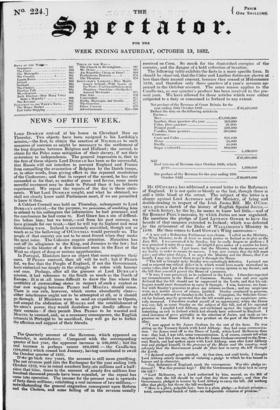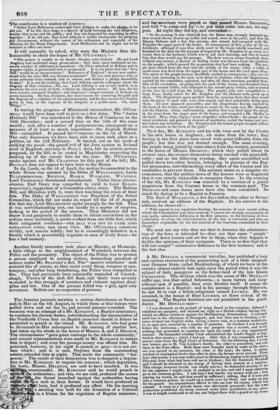Mr. O'CoNNELL has addressed a second letter to the Reformers
of England. .-It is not quite so bloody as the last, though there is - still a little blood at the outset. The subject of the letter is-a charge against Lord ALTHORp and the Ministry, of lying and - double-dealing in -respect of the Irish Juries Bill. Mr. OiCorrs ; ; NELL gives A sketch of the history -of English_ Special Of -Which history, by the by, he seems to know but little,—and -f Sir ROBERT PEEL'S measure, by which Juries are now regulated. . He mentions the pledge of Lord LEVESON GOWER to have the ' benefit Of that measure extended to Ireland; which was defeated ;by the retirement of the Mike. of . WELLIN:ards!'s MinistryUi 1 83 O.: He then comes to Lord GOWER'S Whig successors— "A new and a Reforming Parliament was chosen. I called on the Ministry, the Whig:Ministry, to do at least so much justice to Ireland as to give us the Jury Bill. I was promised it by Stanley, hut be really forgets to perform ; I was promised it more than once. At length I gave notice of a motion for leave to brmg in such a bill.- I got leave, but the Ministry took the measure -out of my bands, in order to secure its success. I was now certain that the bill must pass and after great delays, I so urged the Ministry and the House, that I at length, I may say, forced them to get it through the-House. "The bill :is brought hi by Stanley was exceedingly defective. I pointed out and so eXposed one radical. defect in it, which would have nearly neutralized its entire value, that I got the House to express a strong opinion in my favout; and the bill thus amended passed the House of Commons.
".It was, I soon perceived, to be cashiered in the Lords. I therefore repeated my remonstrances in the House of Commons. Stanley over and over again deelared that the bill should not be suppressed in the Lords, and that his col- leagues would exert themselves to carry it through... I was, however, too fami- liar with Stanley's promises to place any reliance'on them ;- and.my suspicions were; is a matter almost of course, justified. Stanley _continued to. promise, and the bill continued to'slumber in the Lords. Crampton;The Solicitor-Gene- ral for Ireland, angrily protested that the bill would pass; my suspicions natu- rally increased. I therefore availed myself of an opportunity,. when the-House was very full, to taunt Stanley on the subject of this bill, and of his rePiated premises. I assailed Lord Althorp, and exclaimed against the injustice-of not renaedying an evil in Ireland which had already been redressed in England. I cited instances of gross partiality in the selection of Juries, and mule an im- pression:on' the House which it was prudent on the part of the' Ministry to "I now appeal to Sir James Graham for the rest of the facts. He *liras sitting on the Treasury Bench with Lord Althorp : they had some communica- tion. -Sir' James went off to the House of Lords, where Lord Melbourne then was: they had, I was told, some communication. I, of course, cannbt tIll what oceurred ; but this I can say, that when Sir James Grahanfreturned.tothefFrea-4 ' sury Bench, and had spoken again with Lord AlthOrp; soon after Lard Althorp rose and pledged hiniselciia. the presence of the House and the country, most - soleninly that the Government would do their best to Carry the bill through ;
the Lords. •
," I declared myself quite satisfied. At that time, and-until lately, I thought Lord .Althorp utterly incapable of violating a pledge to which he was bound in . hopourand in character. "But, Reformer's of England, mark the consequence. Was this :pledge re- . deemed? Was this promise kept ? Did the Government do their best to-carry thhbill?e' - — • - ." Lord Melbourne, or a Lord authorized by him, moved, on the 9th of • August, that the bill should be read that day three months ; and thus the : Government, pledged in honour by Lord Althorp to carry the bill, slid -nothing after that pledge but throw the bill overboard ! "Here is a plain, palpable fact : here is a plain pledge--a distinet total, unequivocal breach of faith—an indisputable violation of promise." The conclusion is a matter of course,- " Either Lord Melbourne authorized Lbrd Althorp to make the pledge, or he did not. If he did, then there is a breach of faith between the two Ministers, besides that to me and the public ; and they are degraded by remaining in office together : if he did not, then Lord Althorp is totally inexcusable for pledging the Government, without the assent of his colleagues, and especially of the Minister for the Home Department. Lord Melbourne and he ought not to be retained in office one hour."
It will naturally be asked, why were the Ministry thus dis- honourably to cheat the hopes of Mr. O'CONNELL ?- "he answer is readily to be found—Stanley rules Ireland. He and Lord Anglesey had instituted many prosecutions : they have since instituted an im- =ens° number of additional prosecutions : the Press attached to Reform and to popular rights, is prosecuted and re-prosecuted. Is it not plain that the 'Jury
would be an inconvenience ? Reformers of England ! do you now under- stand why the Jury Bill was thrown overboard? Do you now perceive why so mazy promises were violated, and so solemn and distinct a pledge shamefully broken? It is not for nothing, that Lord Althorp and his colleagues incur the disgrace of that violation—NO, no. Lord Althorp is not so very foolish as to proclaim his own want of faith without an adequate motive. He has, for his own reasons, sustained Stanley's and Anglesey's misgovernment of Ireland, on every occasion. He has, of course, tho same reasons for incurring the guilt and the disgrace of a violation of his solemn promise, and he thus secures the Stanley Tarty to him, at the expense of his integrity as a public man. Oh, these Wings ! "
In tracing the progress of Ministerial misconduct, Mr. O'CoN- NELL would have done well to give us a few dates. The "Juries (Ireland) Bill •' was introduced to the House of Commons on the 12th December; read a second time on the 16th of the same month ; arid, after a number of postponements, consequent on a measure of at least as much importance—the English Reform Bill—committed. It passed the Commons on the 1st of March. The only discussion we have been able to trace, took place on a petition, on the 22d February. It turned, not on the mode of striking the panel—the grand evil of the Jury system in Ireland (and in England, previous to PEEL'S Act), but on certain powers proposed, by the bill, to be vested in Magistrates respecting the making up of the county lists for the year. Mr. O'CONNELL spoke against and Mr. CRAMPTON for this part of the bill; Mr. STANLEY does not appear to have been in the House.
In the Lords, on the 3d of April, the motion for committal to the whole House was resisted by the Duke of WELLINGTON, Lords ELLEMBOROUGH, KENYON, RODEN, WICKLOW, WYNFORD. Lord TENTERDEN threatened amendments. Under these circum- stances, Earl GREY was compelled to yield to Lord ELLEN- BOROUGH'S suggestion of a Committee above stairs. The Reform Bill, and Ministers with it, were then touching the crisis of their fate. The Duke of WELLINGTON was President of the Select Committee, which did not make its report till the 3d of August. On that day, Lord MELBOURNE spoke strongly for the bill. That it was notwithstanding lost, can hardly be a matter of surprise, looking to the period of the session. That Ministers did not throw it out purposely to enable them to obtain convictions in the actions since instituted, is pretty evident from one little fact, which their antagonist overlooks--rms BILL WA.S NOT TO COME INTO OPERATION UNTIL THE YEAR 1834. Mr. O'CONNELL conceives vividly, and asserts boldly; but he is exceedingly defective in a faculty which is proverbially requisite to men of lively fancy—he has a bad memory.




























 Previous page
Previous page